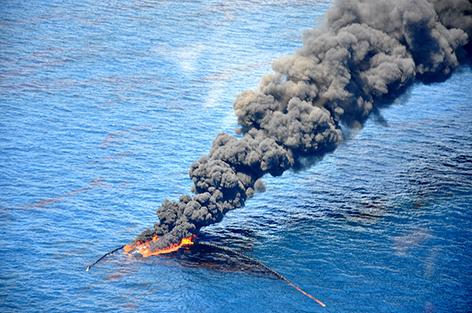FPE Hosts Multiple Federal Agencies to Discuss Oil-Spill Response Strategy
On September 11, the UMD Department of Fire Protection Engineering (FPE) welcomed representatives from roughly 15 federal agencies at a meeting intended to further coordinate efforts surrounding the effects of oil pollution. The quarterly Interagency Coordinating Committee on Oil Pollution Research (ICCOPR) meeting included representatives from the National Oceanic and Atmospheric Administration (NOAA) Office of Response and Restoration (OR&R), the U.S. Coastguard, and the Bureau of Safety and Environmental Enforcement (BSEE). The topical focus of the meeting was the intentional combustion of oil as an oil-spill response technique, also called in-situ burning Michael Gollner, an FPE Associate Professor, presented on the potential for a fire whirl generation technique to aid in the removal of spilled oil over open water, a BSEE-funded research project. The meeting also included presentations on fire modeling from the National Institute for Standards and Technology (NIST), rapid response technologies by ExxonMobil, a review of in situ burning research from BSEE, and on emissions production and transport by the NOAA Air Research Laboratory. Attendees discussed ongoing oil spill research in their respective units, toured the FPE lab facilities, and saw a live fire whirl demonstration. “Since the Deepwater Horizon accident in 2010, there has been renewed attention to develop rapid oil spill cleanup technologies,” said Dr. Gollner. “Meetings such as this are vital for coordination between federal agencies and we were glad to be part of it. Students and researchers from UMD learned a lot from the presentations and we were happy to showcase our own fire research capabilities. While we hope these techniques never will need to be used, having them ready for a potential incident is critical to avoid future environmental damage.” ICCOPR is a 15-member Interagency Committee established by Title VII of the Oil Pollution Act of 1990 (Section 7001). ICCOPR was established to: “Coordinate a comprehensive program of oil pollution research, technology development, and demonstration among the federal agencies, in cooperation and coordination with industry, universities, research institutions, state governments, and other nations, as appropriate, and shall foster cost-effective research mechanisms, including the joint funding of the research." ICCOPR activities are documented in biennial reports to Congress.
Related Articles: October 8, 2019 Prev Next |


